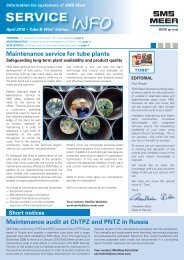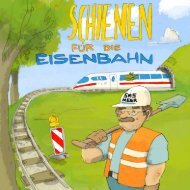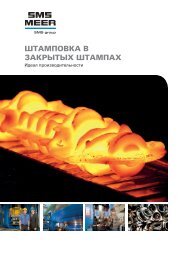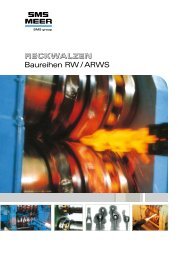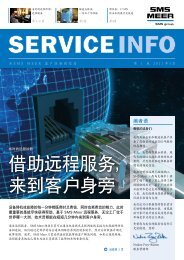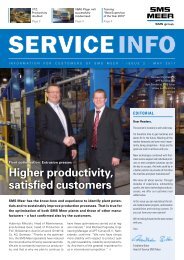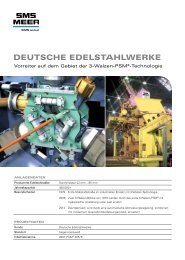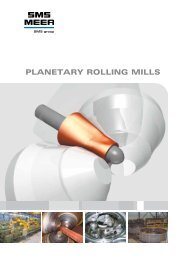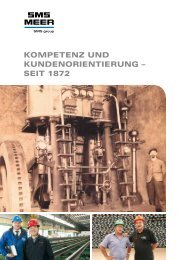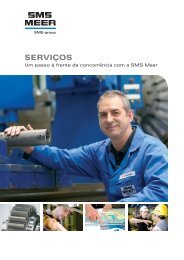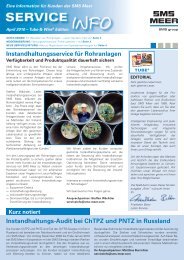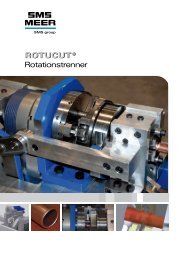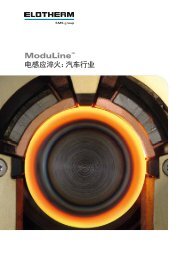LONG PRODUCTS BULLETIN - SMS Meer GmbH
LONG PRODUCTS BULLETIN - SMS Meer GmbH
LONG PRODUCTS BULLETIN - SMS Meer GmbH
Create successful ePaper yourself
Turn your PDF publications into a flip-book with our unique Google optimized e-Paper software.
Piya Chairat, Plant Manager of Siam<br />
Yamato and his colleagues, remain convinced<br />
of the decision in favor of <strong>SMS</strong>:<br />
”With the minimill for medium sections<br />
from <strong>SMS</strong> at the Map Tha Put location<br />
we have bought the right equipment,”<br />
said the manager of the Thai/Japanese<br />
steel enterprise. ”My customers believe<br />
in technology from <strong>SMS</strong> and we had to<br />
invest significantly less money than for<br />
a conventional plant. In this way, we are<br />
able to produce at lower cost and even<br />
the ecological values are excellent.”<br />
Since several months, this perfectly producing<br />
mill has been in operation.<br />
40-year-old idea more<br />
relevant than ever<br />
”Minimill” – this 40-year-old idea is today<br />
more relevant than ever. Germany’s Willy<br />
Korff had designed the mill in the sixties.<br />
In 1968, he inaugurated his steel plant in<br />
Kehl, Baden, Germany, the first of its kind<br />
with electric arc furnaces and an associated<br />
rolling mill for the production of rebars<br />
from <strong>SMS</strong>, at that time worldwide an<br />
absolute novelty.<br />
The idea was revolutionary. From then on,<br />
steel could no longer be only produced<br />
where the coal was located but at any location.<br />
The Kehl port area with easy access<br />
to waterway, rail and highway was ideal to<br />
deliver scrap as starting material.<br />
The finishing train.<br />
Just one year later, nearly 149,000 t of steel<br />
were produced in Kehl. Meanwhile, annual<br />
production is more than 2.2 million t which<br />
corresponds to 23,500 charges per year. In<br />
the early years, the smelting staff required<br />
a few hours for a charge but today the time<br />
required for loading scrap up to liquid<br />
steel takes just 38 minutes.<br />
Good for ecology<br />
and “green“ steel<br />
In the age of ecology and “green“ steel,<br />
Korff’s idea which was realized by applying<br />
<strong>SMS</strong> technology has considerably regained<br />
attraction. Steel production and<br />
further processing in an integrated factory<br />
saves energy. At the same time, the customers<br />
benefit from highly flexible <strong>SMS</strong><br />
plants which can be revamped within very<br />
short periods of time and thus the demand<br />
is correspondingly high.<br />
Successful minimill team<br />
<strong>SMS</strong> has reacted to the market demands<br />
with a comprehensive team. Under the direction<br />
of Paolo Cancian from <strong>SMS</strong> <strong>Meer</strong>,<br />
Italy, colleagues from all over the world<br />
closely cooperate with each other, whether<br />
they are from the Business Area <strong>SMS</strong> <strong>Meer</strong><br />
or from <strong>SMS</strong> Concast.<br />
The success justifies the concept: large and<br />
significant reference plants such as those<br />
at Siam Yamato (medium sections), Tung<br />
Ho in Thailand (bar mill) or a combined<br />
plant from SSM in Košice are already running<br />
at full speed just like a mill in the USA.<br />
With a planned works for heavy beams in<br />
Sulb, Bahrain, another milestone will be<br />
added soon and also in Saudi Arabia a mill<br />
is under construction.<br />
Newsletter 2/2010<br />
»<br />
17



